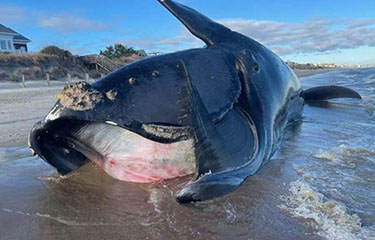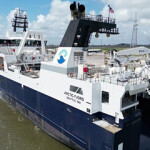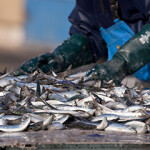Another endangered North Atlantic right whale found dead

A North Atlantic right whale washed up dead on a beach in Virginia Beach, Virginia, U.S.A., adding to the woes the critically endangered species is facing as it staves off extinction.
The dead whale has been identified as a 20-year-old, 43-foot male weighing as much as 70 tons, and NOAA is planning to conduct a necropsy to determine the cause of death. However, NOAA confirmed the whale was not hit by a vessel or entangled in fishing gear, according to WAVY.
In January 2023, the administration of U.S. President Joe Biden recently declined a petition from environmental NGO Oceana designed to create more rules protecting whales from ship strikes, which have been directly linked to right whale mortalities.
And numerous right whales have been found entangled in fishing gear in U.S. waters in recent months. A male right whale nicknamed “Argo” was spotted off the coast of the U.S. state of North Carolina on 27 January, 2023, entangled in what was eventually identified as lobster-fishing gear from the Canadian province of Nova Scotia,, but was successfully disentangled. On 8 January, NOAA reported a right whale trapped by a significant entanglement that likely caused a serious injury, meaning the whale will likely die as a result. And on 18 January, a third right whale was found entangled five miles south of Provincetown, Massachusetts, U.S.A. An effort to disentangle the whale was unsuccessful.
“It’s gut-wrenching to hear about another North Atlantic right whale death – this species cannot afford any more punches. Each death sets the species back and makes the road to recovery bleaker for the 340 remaining North Atlantic right whales,” Oceana Campaign Director Gib Brogan said in a press release. “Oceana calls on NOAA to quickly release a detailed analysis of this whale’s cause of death and take necessary steps to prevent future deaths of this critically endangered species. We do not have strong enough protections in place to prevent human-caused threats of ship strikes and entanglements in fishing gear.”
On 11 February, the Massachusetts Lobstermen's Association sued the federal government in protest of an emergency closure of state fishing grounds enacted on 31 January. An unusual winter concentration of endangered North Atlantic right whales in Cape Cod Bay prompted officials from the U.S. state of Massachusetts and the U.S. National Marine Fisheries Service to order a three-month removal of trap and pot fishing gear in the region through 30 April. The MLA contends the closure is illegal and will cause economic harm to the industry, according to the Associated Press.
"This action isn't warranted, it's overreaching and quite frankly it's unacceptable," MLA Executive Director Beth Casoni said.
The U.S. lobster sector “has a lot of work to do” to address numerous issues facing the fishery, according to Maine Lobster Dealers Association Executive Director Annie Tselikis, even though it has not had a single confirmed right whale entanglement in lobster-fishing gear since 2004. But she said the industry was already doing much more than other sectors, such as the shipping industry or the nascent offshore wind sector.
“In 2009, Maine fishermen [removed] all the float rope offshore that could have potentially gotten entangled in whales as they as they dove. We have instituted weak links in our fishing gear so that it reduces the breakaway strength on the line. We've had multiple year modifications that we have invested in as an industry and as individual fishermen,” Tselikis said. “This is a small boat fishery. We have 4,500 licensed foster fishermen in the state of Maine, and each fisherman has invested probably around USD 30,000 [EUR] individually over the course of their having to do these constant gear modifications. And we have had no serious injuries or mortality ever due to due to Maine lobster fishing – zero. So it's frustrating for us as an industry to constantly be on the defensive and in a situation where the industry is really sort of guilty before being proven innocent. And it's presenting a lot of challenges for this business.”
Speaking at the National Fisheries Institute’s Global Seafood Market Conference on 17 January in Palm Springs, California, U.S.A., Tselikis said the U.S. government’s passage of a six-year reprieve on stricter gear standards and harvest rules at the end of 2022 was “fortunate,” as it brought the lobster fishery into compliance with the Endangered Species Act, the industry can’t sit back and expect its problems to go away.
“We have a lot of research to do. We have a lot of advocacy to do. We want the data NOAA is working with to be the best available,” she said. “But the lobster industry does not kill right whales, that's not something that's happening. We need to reclaim the narrative on what's going on with sustainability issues in the fishery, with fisheries management, and what we're doing to support our communities and our economy.”
Kathryn Novak, the biodiversity and nature director at the Sustainable Fisheries Partnership, a nonprofit working to reduce the environmental impacts of fishing and protect ocean biodiversity, called for the North American lobster fishermen to begin thinking about transitioning to ropeless gear. She acknowledged the gear is costly and requires more testing, but that on-demand gear can allow lobster fishing and whales to coexist.
"In 2022, ropeless and hybrid ropeless gear was not just trialed, but successfully used to fish in both the U.S. lobster and Canadian snow crab fisheries. It’s not without challenges – the gear is costly and needs more testing – but in the meantime, gear trials and pilot projects can contribute to getting lines out of the water, while capturing important feedback from fishers, whose expertise is needed for improving ropeless systems. There are already millions of dollars available from government funds to support trials of the new technology; the main barrier seems to be a perception that even experimenting with ropeless gear will change how the entire fishery operates. It really is time for everyone to move on from their highly fortified positions on this issue and accept that whales need help, fisher livelihoods need protection and there’s an anxious customer base that wants to continue buying lobster but needs assurance that doing so does not threaten endangered whales,” Novak said. “Ropeless gear is never going to be the only form of lobster fishing. But, it is a necessary innovation to lessen risk to whales – and it enables lobstermen to access areas that have been previously closed by fishery managers/NOAA because of the entanglement threat.”
But Tselikis said ...
Photo courtesy of International Fund for Animal Welfare




Share